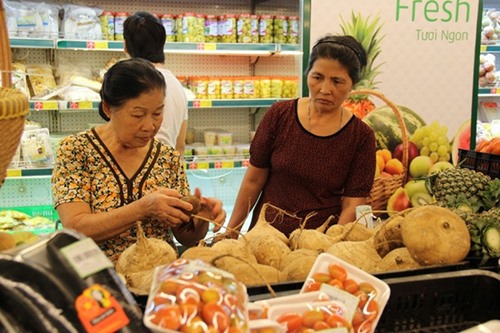 Economy
Economy

A recent report of the Việt Nam Chamber of Commerce and Industry (VCCI) shows free trade agreements will little impact on the country’s enterprises, however, many are against the result.
 |
| Customers shop at a supermarket. A recent report of the Việt Nam Chamber of Commerce and Industry shows free trade agreements will little impact on the country’s enterprises, however, many disagree with the findings. — Photo vietq.vn |
HÀ NỘI — A recent report of the Việt Nam Chamber of Commerce and Industry (VCCI) shows free trade agreements will little impact on the country’s enterprises, however, many disagree with the findings.
The Pháp luật Thành phố Hồ Chí Minh (HCM City Law) quoted Huỳnh Văn Minh, chairman of the HCM City Enterprises Association, as saying that the study results were not realistic.
Small and medium- sized enterprises account for 90 per cent of the country’s total enterprises and these enterprises have several weaknesses, he added. He said the size of these retailers was increasingly shrinking.
Sharing the same view as Minh, Đào Xuân Khương, an expert on distribution and retail, said the largest impact of free trade agreements are the tariffs, which will gradually reduce to zero per cent.
Foreign retailers already had connections with suppliers globally; therefore, if price of Vietnamese producers were not competitive, they would import goods from abroad into Việt Nam.
However, it was not easy for local retailers to do the same as they did not have similar trade relationships with global suppliers, he said.
"The fact that some local retail businesses leave the market shows that they are unable to ultilise the advantages of the preferential tariff of zero per cent, unlike foreign retailers. Besides this, they realise their capital is not enough to compete in the long term, so their decision to withdraw is a wise strategy,” the expert said.
In addition, Nguyễn Phi Vân, an expert on retail and franchise, said it was the consequence of the unready and passive Vietnamese enterprises, which were satisfied with local and regional markets, while investors in neighbouring countries, especially Thailand and Malaysia, were keen for international co-operation. - VNS




